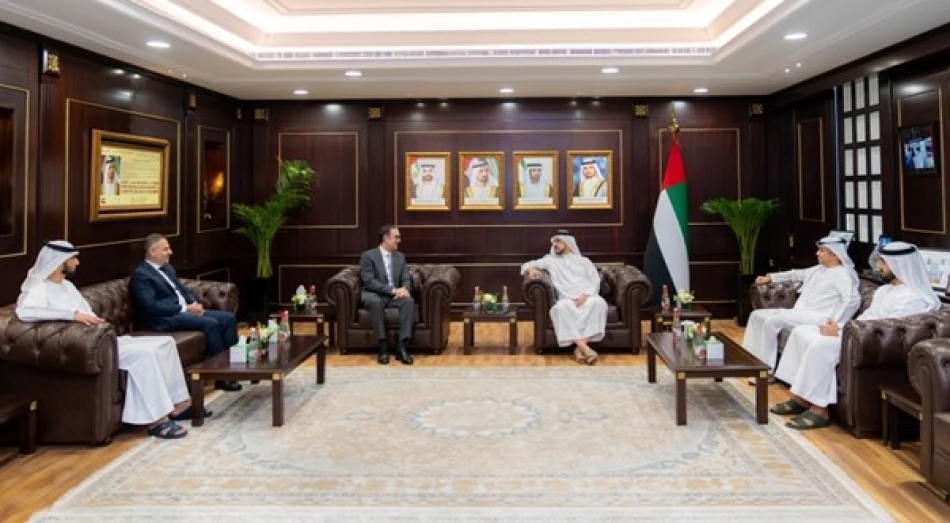
Dubai Electricity Partners with Microsoft to Drive Digital Transformation and Innovation
Dubai's Power Giant Partners with Microsoft to Build World's First AI-Driven Utility Company
Dubai Electricity and Water Authority (DEWA) is making an ambitious push to become the world's first utility company fully powered by artificial intelligence, announcing a strategic partnership with Microsoft UAE that could reshape how cities manage energy infrastructure. The collaboration aims to integrate cutting-edge cloud computing, AI analytics, and cybersecurity solutions across DEWA's operations, supporting Dubai's broader vision to become a global technology hub while advancing its clean energy targets.
A Bold Vision for Digital Transformation
During a high-level meeting at DEWA's headquarters, CEO Saeed Mohammed Al Tayer and Microsoft UAE General Manager Amr Kamel outlined plans to leverage Fourth Industrial Revolution technologies across the utility's core operations. The partnership represents more than a typical tech upgrade—it's positioning Dubai as a testbed for next-generation utility management that other cities worldwide will likely study and replicate.
Al Tayer emphasized that this collaboration forms a fundamental pillar in DEWA's journey to achieve its AI-first utility status, with artificial intelligence being deployed across all major operational processes. This isn't just about efficiency gains; it's about creating a new model for how essential services can be delivered in smart cities.
Strategic Focus Areas
Predictive Maintenance and Grid Optimization
The partnership will deploy AI and advanced analytics for predictive maintenance, demand forecasting, and energy efficiency optimization. This approach mirrors successful implementations in Singapore's smart grid initiatives and reflects growing global trends where utilities use machine learning to prevent outages before they occur, potentially saving millions in emergency repairs and lost productivity.
Renewable Energy Integration
DEWA plans to enhance its renewable energy capacity through AI-driven solutions and cloud computing, directly supporting Dubai's Clean Energy Strategy 2050 and Carbon Neutrality Strategy 2050. The smart grid solutions will enable better management of distributed renewable energy sources—a critical capability as Dubai continues expanding its solar energy portfolio, including the massive Mohammed bin Rashid Al Maktoum Solar Park.
Cybersecurity for Critical Infrastructure
The collaboration includes strengthening cybersecurity resilience for vital infrastructure, addressing growing concerns about digital vulnerabilities in utility networks. This focus comes as global cyber threats against energy infrastructure have intensified, making robust digital security essential for any AI-powered utility system.
Market and Investment Implications
This partnership signals Dubai's serious commitment to digital transformation, potentially attracting increased investment in the emirate's technology sector. For Microsoft, the deal represents a high-profile showcase for its Azure cloud platform and AI capabilities in the Middle East market, where competition with Amazon Web Services and Google Cloud is intensifying.
The initiative also supports the UAE's broader economic diversification strategy, positioning the country as a regional leader in smart city technologies. Success here could generate significant export opportunities for UAE-based tech solutions across the Middle East and emerging markets.
Global Context and Competitive Positioning
Dubai's move follows similar smart utility initiatives in cities like Barcelona, Amsterdam, and Seoul, but the scope of DEWA's AI integration appears more comprehensive. Unlike incremental digitization efforts elsewhere, Dubai is attempting a complete operational transformation—a strategy that carries both higher risks and potentially greater rewards.
The partnership also reflects the UAE's strategy to compete with regional technology hubs. While Saudi Arabia invests heavily in NEOM and other futuristic city projects, Dubai is focusing on upgrading existing infrastructure with cutting-edge technology, potentially offering a more practical model for other established cities.
Building Local Expertise
Beyond technology deployment, the partnership includes joint initiatives for digital skills development and innovation, aimed at building qualified national talent in the sector. This workforce development component addresses a critical challenge facing the UAE's technology ambitions: ensuring local expertise can support and maintain advanced digital infrastructure.
Microsoft's Kamel emphasized the company's commitment to supporting UAE institutions, describing DEWA as "a pioneering model in adopting innovation to provide sustainable services." This collaboration could serve as a template for similar partnerships across the region, where governments increasingly seek private sector expertise to accelerate digital transformation initiatives.
Most Viewed News

 Layla Al Mansoori
Layla Al Mansoori






